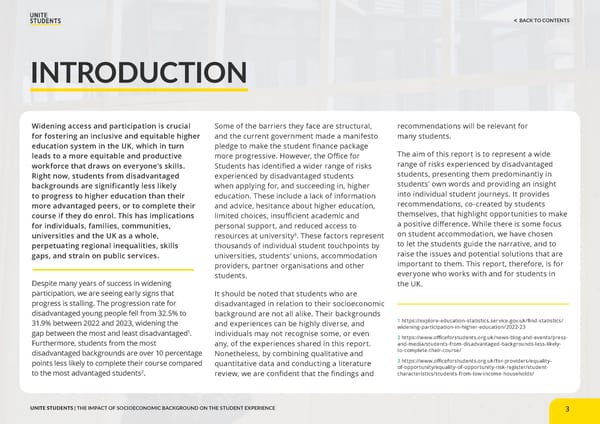3 < BACK TO CONTENTS UNITE STUDENTS | THE IMPACT OF SOCIOECONOMIC BACKGROUND ON THE STUDENT EXPERIENCE Widening access and participation is crucial for fostering an inclusive and equitable higher education system in the UK, which in turn leads to a more equitable and productive workforce that draws on everyone’s skills. Right now, students from disadvantaged backgrounds are significantly less likely to progress to higher education than their more advantaged peers, or to complete their course if they do enrol. This has implications for individuals, families, communities, universities and the UK as a whole, perpetuating regional inequalities, skills gaps, and strain on public services. Despite many years of success in widening participation, we are seeing early signs that progress is stalling. The progression rate for disadvantaged young people fell from 32.5% to 31.9% between 2022 and 2023, widening the gap between the most and least disadvantaged1. Furthermore, students from the most disadvantaged backgrounds are over 10 percentage points less likely to complete their course compared to the most advantaged students2. Some of the barriers they face are structural, and the current government made a manifesto pledge to make the student finance package more progressive. However, the Office for Students has identified a wider range of risks experienced by disadvantaged students when applying for, and succeeding in, higher education. These include a lack of information and advice, hesitance about higher education, limited choices, insufficient academic and personal support, and reduced access to resources at university3. These factors represent thousands of individual student touchpoints by universities, students’ unions, accommodation providers, partner organisations and other students. It should be noted that students who are disadvantaged in relation to their socioeconomic background are not all alike. Their backgrounds and experiences can be highly diverse, and individuals may not recognise some, or even any, of the experiences shared in this report. Nonetheless, by combining qualitative and quantitative data and conducting a literature review, we are confident that the findings and recommendations will be relevant for many students. The aim of this report is to represent a wide range of risks experienced by disadvantaged students, presenting them predominantly in students’ own words and providing an insight into individual student journeys. It provides recommendations, co-created by students themselves, that highlight opportunities to make a positive difference. While there is some focus on student accommodation, we have chosen to let the students guide the narrative, and to raise the issues and potential solutions that are important to them. This report, therefore, is for everyone who works with and for students in the UK. 1 https://explore-education-statistics.service.gov.uk/find-statistics/ widening-participation-in-higher-education/2022-23 2 https://www.officeforstudents.org.uk/news-blog-and-events/press- and-media/students-from-disadvantaged-backgrounds-less-likely- to-complete-their-course/ 3 https://www.officeforstudents.org.uk/for-providers/equality- of-opportunity/equality-of-opportunity-risk-register/student- characteristics/students-from-low-income-households/ INTRODUCTION
 "A Different World": The Impact of Socioeconomic Background on the Student Experience Page 2 Page 4
"A Different World": The Impact of Socioeconomic Background on the Student Experience Page 2 Page 4